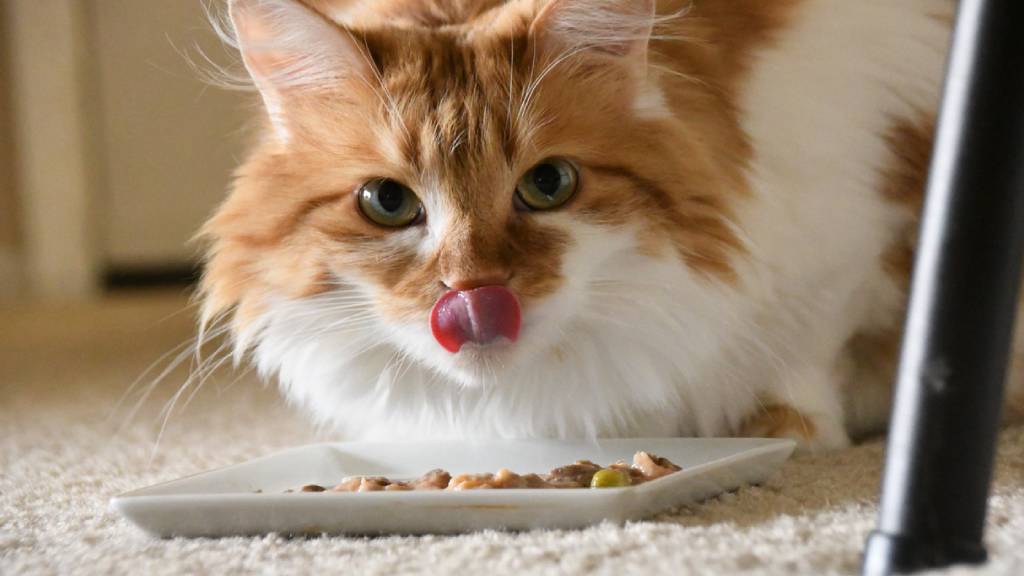The top dietary requirements for older cats

Did you know that cats’ dietary requirements change as they age? What you feed them can directly impact their longevity, their susceptibility to disease and their overall wellbeing. So, in order to continue giving them the best possible chance of an active and healthy life as a senior, you need to be conscious of their changing dietary needs.
1. Exercise portion control for your cat’s meals
What do you do whenever you want to lose a little weight yourself? Aside from exercise, it’s all about what you put into your body, right? Well, it’s exactly the same for your pets.
As your cat gets older, they tend to slow down with their daily activities. Less exercise means they are burning fewer calories. Because of this, if you continue feeding them the same amount of food every day then they may start to put on weight. Your vet will be able to assess your cat and provide guidance on portion control and the right food to ensure they’re getting the important nutrients that they need.
2. Feed your cat food that can prevent common diseases
It’s an unfortunate truth that cats are susceptible to common diseases like diabetes and kidney failure. It’s something we as pet owners have to accept, however there are ways you can reduce the likelihood of those diseases taking control - that is, by influencing your cat’s diet.
There are formulated cat foods on the market that have been created to support the management of kidney disease and diabetes. It’s suggested that a moderate carbohydrate, high protein diet can help arm your cat against diabetes, so be sure to read the label before buying cat food.
Some diseases simply can’t be avoided entirely, it’s also worth considering protecting your cat and your wallet from expensive vet visits. Getting pet insurance while your cat is young and healthy means your pet will be less likely to have any Pre-existing injuries or illnesses which would not be covered.
3. Ensure your older cat gets lots of protein
Did you know that as your cat ages, their protein needs to increase? Without the addition of this requirement in their diet, and combined with their reduced exercise levels, they are liable to see loss of muscle mass, which can cause incidental injuries in their everyday lives.
To counter this and to keep your senior cat fighting fit and healthy, consider feeding them a more nutrient-rich diet full of protein. Make sure the food is easy to digest (wet food over dry kibble for example), and monitor their weight following any change in diet. A proper diet can help to prevent excessive weight loss in older cats.
4. Soft food is best for ageing cats
Just like humans, cats’ bodies start to get a little slower and slightly more brittle with age. This means that hard, sharp food (like dry kibble) can injure – or in some cases break – their teeth.
Soft food should always be the top choice for older cat’s food. It’s easy for them to chew, swallow and digest, and comes with the added bonus of adding more liquid to their diet.
5. Make your pet’s food interesting as they get older
If your cat isn’t eating as well as they used to or are visibly disinterested in eating their usual meals, there are a few tips that can help make their food more enticing.
Adding new flavours such as smelly sardines can draw their attention – not only are they a favourite food for many cats, but they are packed with protein and omega-3 fatty acids.
Remember, though, if your cat isn’t consistently eating well then it’s important to take them to your vet as soon as possible.
6. Boost your cat’s fluids by serving them wet food
Older pets tend to become disinterested in things that used to excite them. You’ll notice they play less often, they don’t scurry after food, and they may even refuse to drink from their usual water bowl unless they are dehydrated.
You can overcome the risk of dehydration – and the subsequent issues this can lead to – by feeding your older cat a diet entirely made up of wet food. Not only will they be more inclined to eat it because it’s soft and easy to swallow, but the water inside the food can help replace fluids they lose during the day – especially if you’ve noticed they are starting to avoid drinking plain water.
Every cat is unique – and so are their dietary needs. Because there’s no one-size-fits-all approach to feeding an older cat, it’s recommended that you consult your vet as well before any major change to their diet.
You can also help reduce your out-of-pocket expenses when visiting the vet – which may happen more regularly as your cat ages – by considering getting a pet insurance policy. Make sure you review your insurance policy to ensure they’re covered for everything they need.
20 Jan 2020